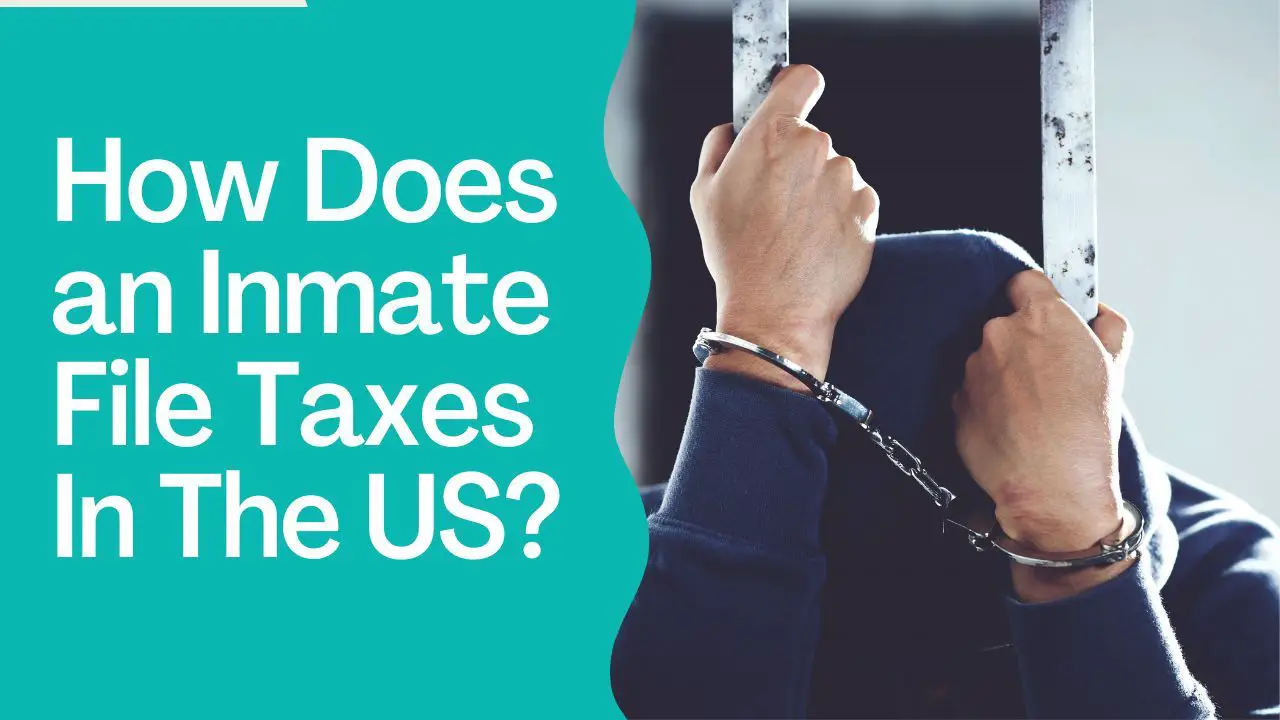How Does an Inmate File Taxes In The US?
How Does an Inmate File Taxes In The US? In this article, we have everything you need to know about Inmate File Taxes In The US.

Filing taxes is an arduous task by all means, and if you have to carry that task out from behind bars, you might be in for a world of pain without the correct information.
No one is exempt from paying taxes, not even prison inmates. The United States has the highest incarceration rate in the world, with nearly one percent of residents age 18 or older currently behind bars. According to the Prison Policy Initiative (PPI), a criminal justice-oriented research institute, that percentage adds up to approximately 2.3 million people confined in prisons and jails. Many of those inmates are expected to file a tax return.
Inmates who earn income from jobs in prisons and those employed via work release may have an obligation to file a return if their earnings meet the minimum requirements. Some inmates may have had a paying job before their incarceration, and those with spouses with a reportable income require a joint filing.
Eligibility For Tax Credits
Tax credits decrease the amount of taxes you owe and may give you a refund at tax time. Even if you don’t have to file a tax return, you can still qualify for tax credits like the Earned Income Tax Credit (EITC) and the Child Tax Credit (CTC).
Income earned by the inmates in prison does not qualify for the EITC or the CTC. However, you may still be eligible for tax credits if you receive income from other sources, such as income earned before your imprisonment or income earned by a spouse who is not incarcerated.
Additionally, as part of COVID-19 relief, Congress has issued three rounds of stimulus checks, which people who are imprisoned are eligible for. If you haven't gotten your stimulus checks or didn’t get the full amount you are eligible for, you can claim that money as the Recovery Rebate Credit on your tax return.
To claim the credits you missed out on, all you need to do is file your taxes. Whether you are eligible for tax credits, filing your taxes is beneficial. Your taxes serve as proof of income that will be helpful in the future, and you can use them for renting a home or applying for loans. It also provides a record of your work history required to qualify for social security benefits.
Tax Filing Requirements
If an inmate earns an income while imprisoned, those wages are not considered “earned income” for the EITC or CTC.
Ineligible income also includes wages paid for work performed while in a work release program during a sentence or while living in a halfway house.
If you regularly send money to an imprisoned loved one, this is not considered a charitable donation. The same is also true for fundraisers, as well as donations that are intended to assist a wrongfully convicted inmate in paying for their appeals.
Under the ACA (Affordable Care Act, also called Obamacare), Americans are required to maintain at least minimum health insurance coverage. However, those who are imprisoned are exempt from this requirement.
Prison tax filing requirements are the same as those in the free world. However, since many inmates earn mere pennies a day, they cannot meet the threshold required for filing taxes. Usually, only those prisoners with a running business outside will need to file taxes.
Gross income requirements for each filing status are as follows.
Single filing status:
- $12,550 if under the age of 65
- $14,250 if age is 65 or older
Married filing jointly:
- $25,100 if both of the spouses are under the age of 65
- $26,450 if one spouse is under age 65 and one is age 65 or older
- $27,800 if both spouses are aged 65 or older
Married filing separately:
$5 for all ages
Head of household:
- $18,800 if under the age of 65
- $20,500 if age is 65 or older
Qualifying widow(er) with dependent child:
- $25,100 if under the age of 65
- $26,450 if age is 65 or older
Filing Taxes For Previous Years
If you have not been able to file taxes in previous years due to incarceration, you have three years from the due date of your last tax return to claim any credits or refunds for which you are eligible.
However, if you did not file your taxes and owe money, you may be subject to penalties and interest; it is always recommended to file your taxes even if you can’t pay them. If you cannot pay the full amount, you may qualify for a payment plan, tax debt settlement, or temporary collection delay from the IRS. You can visit your nearby Taxpayer Assistance Center (TAC) or Low Income Taxpayer Clinic (LITC) for further help.
How To File Taxes As An Inmate?
Case 1: For Temporary Stay
If your prison term is temporary and for a short period, file for a tax extension. The extension allows you to file at a suitable time even after the tax deadline. You would need to fill out “Form 4868, Application for Automatic Extension of Time to File United States Individual Income Tax Return”, which will grant you a six-month extension for filing your taxes. You will need to file this form by the regular tax deadline.
Case 2: For Extended Stay
If your incarceration is for an extended time, you have several options. For one, in-house tax or lawyer services may be available to you for tax assistance.
Another option is to designate someone you trust as Power of Attorney so that they can file your taxes and take care of your finances. In this case, you will be required to complete “Form 2848, Power of Attorney and Declaration of Representative” so that you can assign someone power of attorney. The form requires your signature as well as of the person you chose. You must submit the signed form with the tax return. Your Power of Attorney may be required to get notarized depending on state laws.
Case 3: For Filing With a Spouse
If you are filing with a spouse, you won’t need to worry about it much. You can have your spouse complete the tax forms on your behalf and bring them to you or mail them for signing.
Tax Assistance
For in-person tax services
Volunteer Income Tax Assistance (VITA) and Tax-Aide provide free income tax assistance for those earning less than $57,000 a year, which is the case with many inmates. Accuracy is prioritized, tax preparers at these sites are IRS-certified every year and a second tax preparer reviews all returns. Tax-Aide, run through the AARP, a nonprofit interest group in America, primarily serves seniors (those above 50), although they do not turn younger clients away. On the other hand, VITA offers free tax preparation for workers regardless of age.
For virtual tax filing services
In association with VITA, Code for America has established a full virtual intake process for free tax assistance. You can visit Get Your Refund to connect with an IRS-certified volunteer who will assist you in preparing, reviewing, and filing your taxes. Code for America’s Get Your Refund service is free to those who earn less than $66,000.
You can also contact a LITC (Low-Income Taxpayer Clinic) for free legal help on tax issues or visit your local Taxpayer Advocate Service (TAS) if you need help resolving specific tax concerns.
Read more related articles:
- Can You go to Prison for Theft In the United States?
- Ferguson Unit: Visiting Information, History of This Facility, Inmates Phone, Mail, And FAQ About This Prison
- Active Inmates List In Hancock County Jail & Everything You Need To Know About This Facility
- Pickaway County Active Inmates: How to search for Active Inmates of Pickaway County Prison
- Trumbull County Jail: Brief Overview Visiting Hours, Inmate Phones, And Sherif's Location
- Worst Prisons In The State Of West Virginia
- Top 7 Worst Federal Prisons In The United States
- Craighead County Detention Center: Sherif's Office and How to Contact Inmates?
- Byrd Unit Texas: Everything You Need To Know About This Facility
- 10 Worst Prisons In The State of Kentucky
